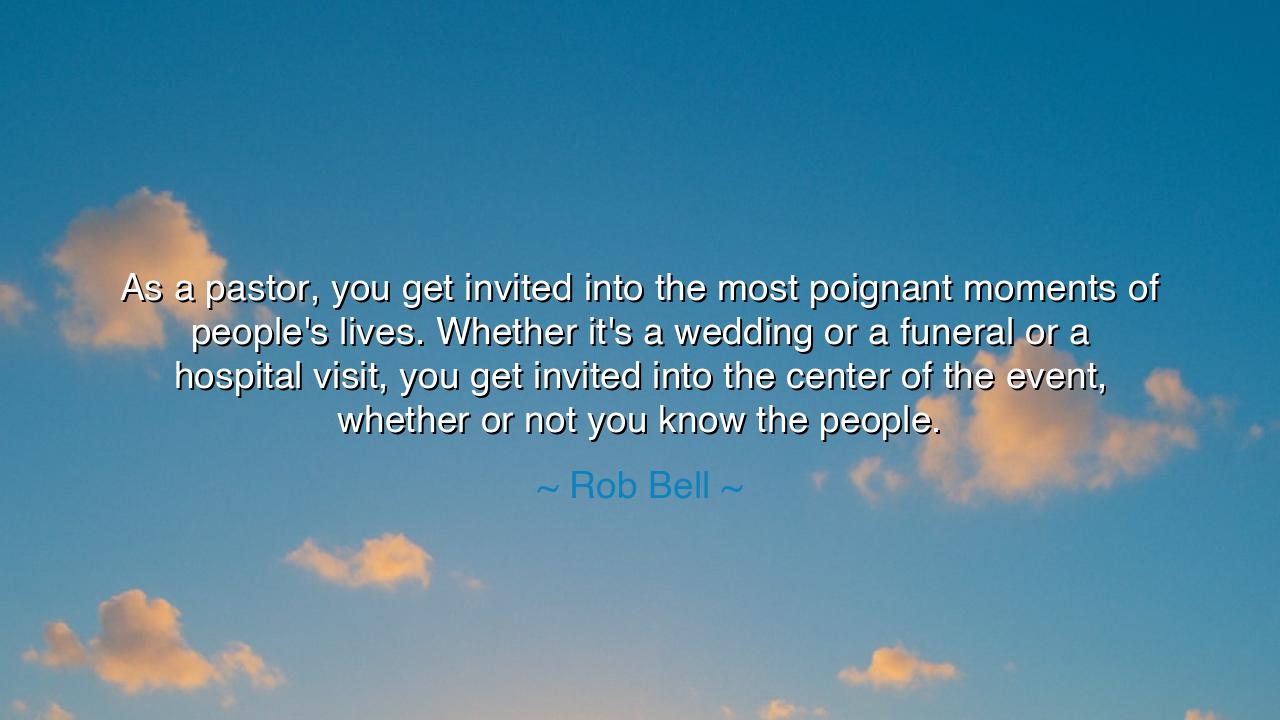
As a pastor, you get invited into the most poignant moments of
As a pastor, you get invited into the most poignant moments of people's lives. Whether it's a wedding or a funeral or a hospital visit, you get invited into the center of the event, whether or not you know the people.






In the words of Rob Bell, there is revealed the sacred calling of the shepherd of souls: “As a pastor, you get invited into the most poignant moments of people's lives. Whether it's a wedding or a funeral or a hospital visit, you get invited into the center of the event, whether or not you know the people.” These words unveil a truth long cherished by the ancients—that there are those whose duty it is to walk beside humanity at its highest joys and deepest sorrows, bearing witness where others falter.
The pastor is not merely a preacher of words, but a guardian of thresholds. At the wedding, he blesses new beginnings; at the funeral, he consoles amidst endings; in the hospital, he brings the whisper of hope when the body trembles before death. These are not small matters, but the central fires of human existence—love, loss, and the fragile span of life. To be invited into these spaces is to stand at the very heart of what it means to be human.
History remembers Ambrose of Milan, who was called from the life of a governor into the sudden role of bishop. Though unprepared, he became the one whom emperors and peasants alike turned to in their most decisive hours. Like Bell describes, Ambrose entered homes in mourning, presided over unions, and spoke courage into the ears of the dying. His presence mattered not because he was always known, but because he bore the authority of compassion and the weight of spiritual witness.
There is deep wisdom in Bell’s reflection, for it shows us that true ministry is not built on familiarity but on presence. The pastor steps into the center of the storm, whether a stranger or a friend, because love itself does not ask for credentials—it asks only for courage. To weep with those who weep, to rejoice with those who rejoice, to sit in silence when words fail—these are the acts that sanctify human life.
Thus, let this lesson endure: those who are called to guide others must be ready to enter both light and shadow. For the soul does not always need sermons; sometimes it needs only a steady companion at the edge of life’s mysteries. And whether we are pastors or not, we too are called to this holy work—to stand beside others in their most poignant moments, and by our presence remind them that they are not alone in joy, nor abandoned in sorrow.






LHLe HoangNam
Rob Bell’s insight really shows how pastors play a pivotal role in people’s emotional journeys. It’s interesting how pastors are often invited to these deeply emotional and significant events, despite not always knowing the individuals involved. Do you think this gives pastors a unique perspective on the meaning of life and death, or does it sometimes make their work feel overwhelming? It seems like they are constantly walking alongside people during times of vulnerability.
LKLinh Khong
What a powerful reflection from Rob Bell on the sacred trust people place in pastors during the most important moments of their lives. Whether celebrating or mourning, a pastor becomes a guide through life’s major events. Do you think there’s a specific skill or quality that makes a pastor particularly suited to handling these experiences? Perhaps it’s their ability to empathize deeply, even with people they don’t know personally.
MHMinh Hieu
It’s fascinating how Rob Bell describes the role of a pastor as being invited into the most intimate and poignant events of people's lives. It must create a deep sense of connection and purpose, even when the individuals involved are strangers. Do you think pastors develop a unique perspective on life and relationships by witnessing so many different, powerful moments? It’s like being part of the human experience in a way few others are.
TVdo phuc tuong vi
Rob Bell's words really make me think about how impactful a pastor's role can be. Being invited to share in such profound moments, whether it's celebrating a wedding or comforting a family during a funeral, must require immense emotional resilience. How do pastors prepare for these kinds of moments, especially when they don’t have personal connections to the people they’re serving? It seems like such a selfless act of service.
UGUser Google
I think Rob Bell’s quote really highlights the unique position pastors hold in society. They're often asked to be present during life's most pivotal moments—whether joyous or sorrowful. It must be a privilege, but also a challenge. Do you think it’s difficult for pastors to maintain boundaries between their professional role and personal emotions, especially when they’re deeply involved in such personal events, even without knowing the individuals?